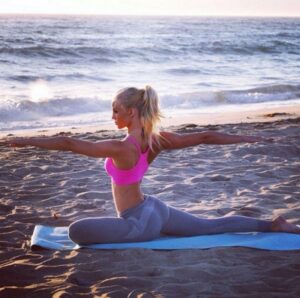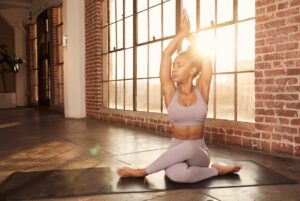Introduction (What Is The Best Time To Exercise)
Exercise is a cornerstone of a healthy lifestyle, offering numerous benefits, such as improved physical fitness, mental well-being, and overall health. While the type and intensity of exercise are crucial, the timing of your workouts can significantly impact their effectiveness.
Many people wonder, “What is the best time to exercise?” In this comprehensive guide, we’ll explore the science behind workout timing and help you determine the optimal time for your fitness routine. (What Is The Best Time To Exercise)
Circadian Rhythms: The Body’s Internal Clock
To understand the best time to exercise, it’s essential to delve into circadian rhythms. These are the body’s internal biological clocks, which regulate various physiological processes over a 24-hour cycle.
Circadian rhythms influence hormone secretion, body temperature, metabolism, alertness and energy levels.
Scientists have found that the timing of exercise can interact with these circadian rhythms to affect your workouts’ effectiveness and overall health benefits. Let’s explore different workout times to help you make an informed choice. (What Is The Best Time To Exercise)
1) Morning Exercise: A Fresh Start

Morning workouts are popular for several reasons. Exercising in the morning can help kickstart your metabolism, as physical activity raises your body temperature and boosts calorie burning throughout the day. It’s a great way to energize and set a positive tone for the rest of your day.
Furthermore, morning exercise can enhance mood and mental alertness by releasing endorphins and improving cognitive function. This positive mindset can help you make healthier choices throughout the day. (What Is The Best Time To Exercise)
Some studies suggest that morning exercise can improve sleep quality. Regular physical activity helps regulate your sleep-wake cycle, and a morning workout can synchronize your circadian rhythm with your daily routine.
For those with busy schedules, morning workouts can be ideal. It ensures you’ve completed your exercise before the day’s distractions and commitments arise. (What Is The Best Time To Exercise)
2) Afternoon Workouts: Peak Performance

The afternoon presents another excellent time for exercise. Research indicates that muscle strength and flexibility peak in the late afternoon. This makes it a prime time for resistance training and high-intensity workouts.
Additionally, your body temperature is higher in the late afternoon, reducing the risk of injury and enhancing overall performance.
Many individuals find it easier to maintain motivation for afternoon workouts, as they have more energy and are less prone to fatigue compared to the early morning. This makes it a convenient choice for those with work or family responsibilities during the morning hours. (What Is The Best Time To Exercise)
3) Evening Exercise: Stress Relief

While some argue that late-night workouts may interfere with sleep, it isn’t true for everyone. The impact of evening exercise on rest depends on individual preferences and sensitivities to exercise-induced adrenaline release.
Some people even find evening exercise a great way to de-stress after a long day.
Evening workouts can help you unwind, clear your mind, and improve your mood. For those less sensitive to potential sleep disturbances, it can be a valuable way to end the day on a positive note.
If you work out in the evening, consider less intense activities like yoga, stretching, or light cardio, which are less likely to interfere with your sleep. (What Is The Best Time To Exercise)
The Importance of Consistency
Regardless of the ideal time for exercise, consistency is paramount. Regular, consistent exercise helps your body adapt to the workout routine and maximize long-term benefits. The specific time of day becomes less critical when you prioritize sticking to your schedule.
Listen to Your Body
Scientific guidelines can provide helpful insights, but your body’s signals and individual preferences should be the ultimate deciding factors in your workout timing.
Please pay attention to how you feel at different times of the day and experiment to see when your energy levels and motivation are at their peak.
The Role of Chronotype
Your chronotype, which is your natural inclination for being a morning person or night owl, plays a significant role in determining your ideal workout time. Morning people may naturally prefer early morning exercise, while night owls might find evening workouts better suited to their body rhythms. (What Is The Best Time To Exercise)
Determining your chronotype involves self-awareness and observation of your energy levels and alertness at different times of the day. This can help you make an informed decision about when to schedule your workouts.
Factors to Consider When Choosing Your Workout Time
- Personal Schedule: Your daily commitments, work hours, and family responsibilities will significantly influence when you can realistically exercise. Choose a time that aligns with your daily routine.
- Energy Levels: Pay attention to your energy levels throughout the day. Opt for a time when you feel naturally more energetic and motivated.
- Mood and Stress Levels: Consider when you need stress relief and mood enhancement the most. If you want to reduce stress, choose a time that aligns with when you typically experience the most stress. (What Is The Best Time To Exercise)
- Workout Type: Different workouts may be better suited for specific times. For example, high-intensity training may be more effective in the late afternoon, while evening workouts are better for relaxation-focused exercises.
- Sleep Sensitivity: If you’re sensitive to late-night exercise affecting your sleep, consider sticking to morning or afternoon workouts.
Conclusion
The best time to exercise ultimately depends on your preferences, daily schedule, and circadian rhythm. Whether you’re a morning enthusiast who loves the energy boost of early exercise. This afternoon aficionado thrives on peak performance, or an evening exercise enthusiast seeking stress relief; the key is to stay active and maintain a consistent workout routine. (What Is The Best Time To Exercise)
While the science of timing exercise can provide valuable insights, the most crucial factor is to make exercise a regular part of your life. Choose the time that aligns with your lifestyle and allows you to exercise consistently. Whether you’re a morning, afternoon, or evening exerciser, the ultimate goal is to keep moving and experience the many physical and mental benefits of regular physical activity.
